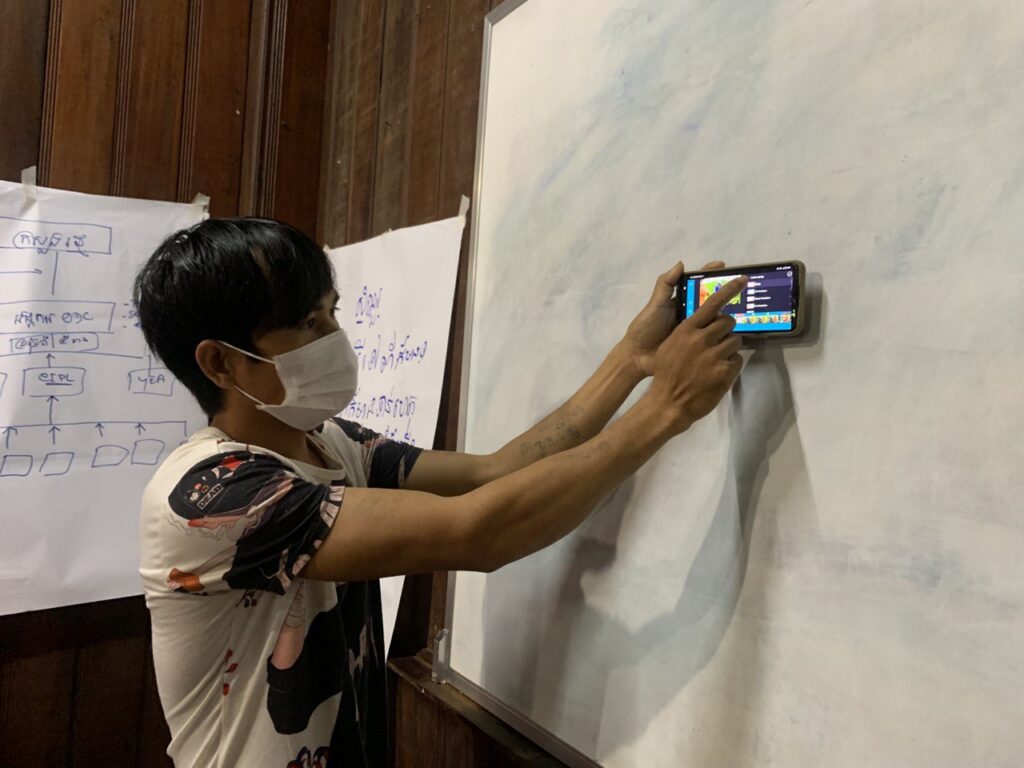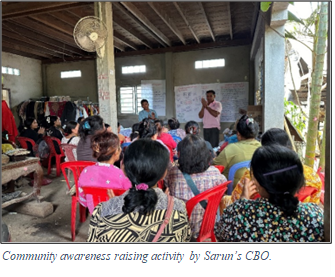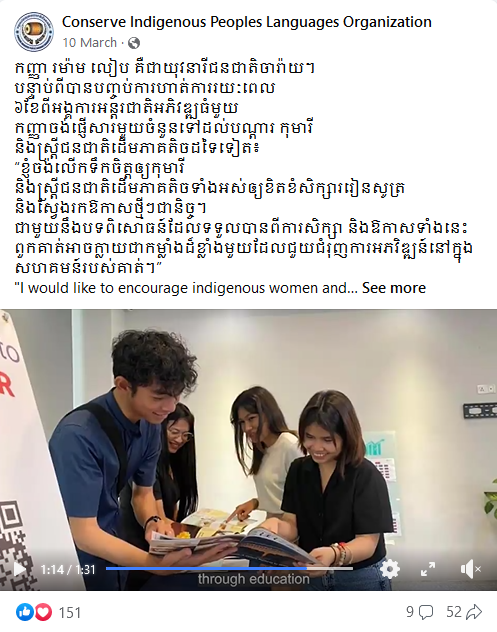The Civil Society Activity (CSS) project made significant progress in empowering indigenous voices, through its partnership with Open Development Cambodia (ODC) and Conserve Indigenous People’s Language (CIPL) Organization. Acknowledging the limitations of training every community member, the project employed a strategic approach: transmitting knowledge from focal persons to their communities. These designated individuals have become conduits for information dissemination, resulting in a profound impact.

Mr. Lao Bundinh is a 27-year-old Jarai indigenous youth living with his family in Pak Thum village, Pak Nhai commune, Ou Yadav district, Ratanakiri province. He had limited knowledge regarding social media, script writing, and other technological tools. Nevertheless, he had a strong desire to share his culture and voice with a wider audience through social media channels. He also faced a significant knowledge gap, particularly in the realm of digital security.
Throughout his active participation in project activities, training sessions, and engagement with local authorities, he gained valuable insights and became aware of the knowledge gaps he needed to address. Despite encountering various challenges, including barriers related to knowledge, technical skills, and time constraints, he persevered and continued to pursue higher levels of expertise.
He seized the opportunity to undertake the role of a trainer, conveying his acquired knowledge to indigenous youths within his community. His training sessions focused on topics such as Facebook security, Telegram two-step verification, and video production scripting. He also has gained the capability to express his insights and address community issues effectively through social media channels while sharing his knowledge within his community. He takes great pride in his personal growth and achievements, having reached this significant milestone. He remains committed to ongoing knowledge sharing and making contributions to increasing awareness among indigenous communities in the future.
Similar Stories
Indigenous youths’ improvement on mobile report
Being trained to use a smartphone to report reflects the view of indigenous youth. “This training is very significant for me since I could use it to empower my community and share with outsiders who we are and what we are living with.” Mr. Lao Bundinh is a Jarai indigenous youth. He was born in a rural area of Phork Thom village, Phork Nhai commune, Ouyadav district, Ratanakiri province, and he has lived there for 27 years. He did not have much knowledge of story writing as well as photos and video shooting. However, he would like to share his daily life as an indigenous youth, his livelihood, and culture, as well as the environment in his community with other people through social media. Mr. Lao Bundinh was sharing how to cut the video by using smartphone during the mobile report training provided by CIPL. Until when he got to know about the mobile report training organized by Conserve Indigenous Peoples Languages (CIPL) in collaboration with Open Development Cambodia (ODC), he had the chance to learn what he liked and waiting for. He joined the mobile report training, which aims to build the capacity of indigenous youths on how to use a mobile phone to report on natural resources management by writing stories and using photos as the evidence-based mechanism on 21 – 22 September 2022 in Ratanakiri province. It required him to put more effort and time into improving his skills. Indigenous youths were joining the training on the mobile report provided by CIPL at Ratanakiri province. His commitment to sharing what is happening within his community inspired him to persevere through the challenges. Currently, he can write a story and edit a video to share on the social media platform. He feels very thankful for the organizer giving him an opportunity to learn what he always wishes to. He posted his own video, “Finished the mobile report training on environment, video shooting, and video editing from CIPL, I could do some practices,” to illustrate the beauty of the forest, environment, and livelihood of his community on social media.
Shifting attitudes towards sexual harassment
Mr. Oeun Sarun is a 71-year-old CBO leader in Thmey village, Bansay Treng commune, Thmor Kol district, Battambang province. He leads a CBO called “Sahakum Morodak Phum Thmey,” which was selected as one of the cluster members in the Together for Gender Justice (T4GJ) project in October 2022. Mr. Oeun Sarun is a 71-year-old CBO leader in Thmey village, Bansay Treng commune, Thmor Kol district, Battambang province. He leads a CBO called “Sahakum Morodak Phum Thmey,” which was selected as one of the cluster members in the Together for Gender Justice (T4GJ) project in October 2022. Similar to other CBO leaders participating in the T4GJ project, Mr. Sarun facilitated community meetings to share knowledge and understanding of sexual harassment so that participants can further spread the knowledge to the family and neighbors. In his own time, he also continuously disseminated his knowledge to his neighbors and friends as well. He observed that his family and community gradually changed their thinking on sexual harassment, by reflecting on what they did in the past and how they can prevent it now and in the future.
CSS’s Intern Romam Leap shares her internship experience
CSS produced a short video to highlight the internship experiences of former communications intern and Jarai indigenous youth Romam Leap. The video was very well received by the public on social media, generating approximately 150 reactions, 52 shares, and 2,700 views on Facebook


